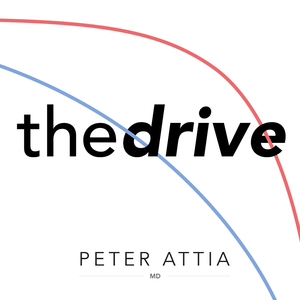
Health First, Innovation Second. Smisha Agarwal on what needs to change in global digital health.
04/16/25 • 44 min
Dr. Smisha Agarwal (Johns Hopkins University Global Center for Digital Health Innovation) joins me to unpack some hard truths on the Global Perspectives on Digital Health podcast.
🛑 Why global health systems remain fragile
📉 How digital tools often scale without legitimacy
📊 What’s wrong with our fixation on "did it work?" and significance values
🔁 And how global health is stuck in systems that haven’t evolved
💬 “We’re brought into a system of aid and global development that has stopped questioning how things were done. And the world has progressed, but our field hasn’t.”
🔑 But Smisha also offers a way through:
Thinking differently about evaluating system level impact
The work of the Oxford Open Health Journal to increase visibility and representation of people's research in LMICs
👉 If you work in digital health, research, policy, or global development this is for you.
About Smisha:
Dr.Smisha Agarwal, PhD, MPH, MBA, BDS is the Director of the Center for Global Digital Health Innovation and Associate Professor in the Department of International Health at the Johns Hopkins Bloomberg School of Public Health. She brings expertise in advancing primary health
care through strengthening community health systems and leveraging innovative technological solutions including digital devices. A part of her research has focused on using predictive analytics and machine learning algorithms based on routine monitoring data to enhance our understanding of quality of care, create safety nets to care for high-risk populations and improve effectiveness of reproductive health services.
Over the last two decades, her research has been leveraged by normative agencies like WHO to develop guidelines on national digital
transformation, donors to guide investments in primary health care, and governments to develop their national digital health strategies. She is the Editor-in-Chief of the Oxford Open Digital Health Journal.
- (00:00) - Introduction, Smisha's background
- (05:01) - Impact of Global Health Aid Cuts
- (10:03) - Challenges in Monitoring and Evaluation
- (15:35) - Health First: How to think about outcomes, measuring the right things
- (20:54) - Supporting healthcare workers as a goal
- (26:37) - Impact: Measuring what matters
- (28:39) - Donor decision making dynamics
- (30:09) - Rethinking system level success: from yes/no to more nuance
- (33:50) - Innovations in Academic Publishing
- (37:37) - Challenging the Status Quo in Global Health
- (42:20) - Upcoming events in Global Digital Health
Dr. Smisha Agarwal (Johns Hopkins University Global Center for Digital Health Innovation) joins me to unpack some hard truths on the Global Perspectives on Digital Health podcast.
🛑 Why global health systems remain fragile
📉 How digital tools often scale without legitimacy
📊 What’s wrong with our fixation on "did it work?" and significance values
🔁 And how global health is stuck in systems that haven’t evolved
💬 “We’re brought into a system of aid and global development that has stopped questioning how things were done. And the world has progressed, but our field hasn’t.”
🔑 But Smisha also offers a way through:
Thinking differently about evaluating system level impact
The work of the Oxford Open Health Journal to increase visibility and representation of people's research in LMICs
👉 If you work in digital health, research, policy, or global development this is for you.
About Smisha:
Dr.Smisha Agarwal, PhD, MPH, MBA, BDS is the Director of the Center for Global Digital Health Innovation and Associate Professor in the Department of International Health at the Johns Hopkins Bloomberg School of Public Health. She brings expertise in advancing primary health
care through strengthening community health systems and leveraging innovative technological solutions including digital devices. A part of her research has focused on using predictive analytics and machine learning algorithms based on routine monitoring data to enhance our understanding of quality of care, create safety nets to care for high-risk populations and improve effectiveness of reproductive health services.
Over the last two decades, her research has been leveraged by normative agencies like WHO to develop guidelines on national digital
transformation, donors to guide investments in primary health care, and governments to develop their national digital health strategies. She is the Editor-in-Chief of the Oxford Open Digital Health Journal.
- (00:00) - Introduction, Smisha's background
- (05:01) - Impact of Global Health Aid Cuts
- (10:03) - Challenges in Monitoring and Evaluation
- (15:35) - Health First: How to think about outcomes, measuring the right things
- (20:54) - Supporting healthcare workers as a goal
- (26:37) - Impact: Measuring what matters
- (28:39) - Donor decision making dynamics
- (30:09) - Rethinking system level success: from yes/no to more nuance
- (33:50) - Innovations in Academic Publishing
- (37:37) - Challenging the Status Quo in Global Health
- (42:20) - Upcoming events in Global Digital Health
Previous Episode

Digital mental health research insights
Bringing research to implementation.
Shubs is joined by Lucy Cesnakova from DiMe in this quick dive into an important piece of research bringing insights to advance digital solutions that serve mental health, DiMe's work here was great here because Lucy and the team intentionally sought out input from different countries, access levels and other demographics across the ecosystem. It's great that the Wellcome Trust funded this work. And more of this type of research would clearly be, ahem, welcome.
Why should I listen?
This will be useful if you are building solutions with underserved communities in mental health and applies both to high income and LMIC settings.
If you are researching digital endpoints and biomarkers in mental health or involved in health system transformation for mental health this is well worth a listen.
We cover the big commonalities across all geographies, plus what we can learn about local nuances as well as some key a-ha moments Lucy and the team gained.
Check out my substack article for a written reflection on this episode.
Chapters
00:00 Introduction to DiMe and Lucy's work
03:57 Current healthcare context
06:01 Methodology of Research and Data Collection
08:27 Key Findings: Universal Commonalities in Mental Health Technologies
16:04 Unique local insights
Here's the full report: https://datacc.dimesociety.org/mental-health/
DiMe society:https://dimesociety.org/
About Lucy:
Lucy Cesnakova, MS, is a Program Lead at Digital Medicine Society (DiME).
At DiME Lucy has led several projects in the space of digital measurements and technologies for health: a flagship pre-competitive collaboration project to advance the digital measurement of nocturnal scratch; an initiative that explores path forward for sensor-based digital health technologies for mental health; or recent work on use of patient-generated health data in development of medical products and health technologies.
At DiMe she works with industry, patient organizations, regulators, clinicians and payers to create resources that will improve adoption of digital technologies in research and care. In the past, Lucy has led technical development of digital endpoints or other software solutions as a product lead.
Next Episode

Regulatory strategy for founders and policy makers
Practical breadth and depth on the global state of regulation from someone at the cutting edge of regulatory policy.
Shubs welcomes Hugh Harvey, founder of Hardian Health and a regulatory expert in digital health. Shubs and Hugh discuss the complex landscape of medical device regulation worldwide, with emphasis on how these frameworks impact digital health innovation in low and middle-income countries (LMICs).
Guest Background
Hugh Harvey is a former radiologist who transitioned to the digital health industry. After working at Babylon Health and serving as Clinical Director at Kheiron Medical (where they secured Europe's first CE mark for a deep learning-based breast cancer detection device), Hugh founded Hardian Health to help companies navigate regulatory pathways for AI and digital health solutions.
Key Discussion Points
The Global State of Medical Device Regulation
- Regulatory Variation: Hugh explains the significant differences in regulatory approaches between regions like the EU (stricter) and the US (increasingly deregulatory)
- (Some) LMIC Contexts : Only about 40% of African countries have actual medical device regulations, with only South Africa having comprehensive frameworks
- Cybersecurity Risks: Medical health data sells for more than financial data on black markets, making robust regulation essential for protecting patients
Challenges for Digital Health Innovators
- Founder Misconceptions: Many startups allocate insufficient resources for regulatory compliance. Regulatory compliance should represent 5-10% of a company's overall budget.
- Regulatory Debt: Postponing regulatory considerations creates compounding challenges that become increasingly difficult to address later down the line
- Large Language Models: Hugh's skepticism about LLMs in healthcare, noting they're "massively overrated" for medical reasoning tasks and face significant regulatory hurdles, and yet Hugh sees some promise over the hill.
Practical Guidance for Digital Health Companies
- Getting the mindset right: Thinking about it in the same way you might approach a driving test.
- Universal Standards: Quality management systems (ISO 13485) are increasingly harmonized globally
- Approach in LMICs: Thinking about deploying in an place where there is little to no regulatory structure? You might want to consider securing certification in countries with established regulatory pathways prior, and then work with the local government.
What Regulators Could Do Better
- Proactivity: Regulators should be more proactive in providing guidance on novel technologies
- Transparency: More open sharing of regulatory decisions would help the entire industry move forward
- Capacity: Governments should increase funding for regulatory bodies to reduce backlogs and improve efficiency
Chapters
00:00 Introduction and Background
04:22 The State of Regulation in Healthcare
06:36 Why so regulated?
09:24 Global Perspectives on Regulatory Approaches
16:53 Harmonization of Global Standards
19:34 Recommendations for Regulators
31:53 Regulatory strategy for founders: The Driving Analogy
42:14 What if there is little or no regulatory enforcement where I operate?
43:59 The Five Stages of Regulatory Grief
47:44 Hugh's spicy takes 🌶️
Key Quotes
- "Regulations are written in blood... the reason regulations/FDA are as they are today is because of events like thalidomide.
- "What's the cost of not being compliant? Well, it's everything, it's your entire business model."
- "The attack surface vector, especially under these generative AI models, is huge, vast, and frankly, completely unknown."
Hugh provides a compelling case for embracing regulatory requirements as not just necessary obligations but strategic advantages. While acknowledging the challenges of navigating complex regulatory landscapes, particularly for innovators working in regions with limited frameworks, he offers practical guidance on approaching compliance as a foundation for long-term success in digital health. You can find Hugh and his work at hardianhealth.com
Liked this episode? You might also like these:
Episode 3: Bilal MateenEpisode 5
If you like this episode you’ll love
Episode Comments
Generate a badge
Get a badge for your website that links back to this episode
<a href="https://goodpods.com/podcasts/global-perspectives-on-digital-health-426508/health-first-innovation-second-smisha-agarwal-on-what-needs-to-change-89629121"> <img src="https://storage.googleapis.com/goodpods-images-bucket/badges/generic-badge-1.svg" alt="listen to health first, innovation second. smisha agarwal on what needs to change in global digital health. on goodpods" style="width: 225px" /> </a>
Copy




